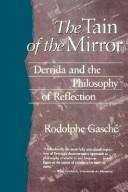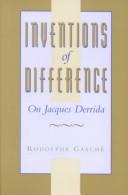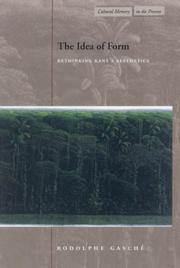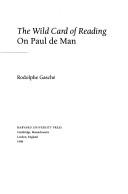| Listing 1 - 10 of 38 | << page >> |
Sort by
|
Book
ISBN: 3476002519 9783476002518 Year: 1973 Volume: 26 Publisher: Stuttgart Metzler
Abstract | Keywords | Export | Availability | Bookmark
 Loading...
Loading...Choose an application
- Reference Manager
- EndNote
- RefWorks (Direct export to RefWorks)
Philosophy of science --- Lévi-Strauss, Claude --- Durkheim, Emile

ISBN: 0674867009 0674867017 9780674867000 9780674867017 Year: 1986 Publisher: Cambridge, Mass.
Abstract | Keywords | Export | Availability | Bookmark
 Loading...
Loading...Choose an application
- Reference Manager
- EndNote
- RefWorks (Direct export to RefWorks)
Derrida, Jacques --- Derrida, Jacques. --- Derrida, J. --- Derida, Žak --- Derrida, Jackes --- Derrida, Zhak --- Deridah, Z'aḳ --- Deridā, Jāka --- Dirīdā, Jāk --- Деррида, Жак --- דרידה, ז'אק --- Derrida (Jacques).
Book
ISBN: 9780804760607 9780804760614 Year: 2009 Publisher: Stanford, Calif. Stanford University Press
Abstract | Keywords | Export | Availability | Bookmark
 Loading...
Loading...Choose an application
- Reference Manager
- EndNote
- RefWorks (Direct export to RefWorks)
fenomenologie --- Theory of knowledge --- Patočka, Jan --- Derrida, Jacques --- Heidegger, Martin --- anno 1900-1999 --- Europe --- Phenomenology. --- Philosophy, European --- Philosophy --- History. --- Phenomenology --- Philosophy, Modern --- Council of Europe countries --- Eastern Hemisphere --- Eurasia

ISBN: 0674464435 0674464427 Year: 1994 Publisher: Cambridge, Mass. Harvard University Press
Abstract | Keywords | Export | Availability | Bookmark
 Loading...
Loading...Choose an application
- Reference Manager
- EndNote
- RefWorks (Direct export to RefWorks)
Philosophy of science --- Derrida, Jacques --- Philosophy, French --- Difference (Philosophy) --- Philosophie française --- Différence (Philosophie) --- Criticism and interpretation --- Derrida, Jacques. --- Derrida, J. --- Derida, Žak --- Derrida, Jackes --- Derrida, Zhak --- Deridah, Z'aḳ --- Deridā, Jāka --- Dirīdā, Jāk --- Деррида, Жак --- Philosophie française --- Différence (Philosophie) --- Criticism and interpretation. --- דרידה, ז'אק

ISBN: 0804746133 0804746214 9780804746212 9780804746137 Year: 2003 Publisher: Stanford (Calif.) Stanford university press
Abstract | Keywords | Export | Availability | Bookmark
 Loading...
Loading...Choose an application
- Reference Manager
- EndNote
- RefWorks (Direct export to RefWorks)
Aesthetics, Modern --- Kant, Immanuel, --- Aesthetics. --- Aesthetics --- History --- Kant, Immanuel --- Kant, Emmanuel --- Kant, Emanuel --- Kant, Emanuele --- Kant, I. --- Kānt, ʻAmmānūʼīl, --- Kant, Immanouel, --- Kant, Immanuil, --- Kʻantʻŭ, --- Kant, --- Kant, Emmanuel, --- Ḳanṭ, ʻImanuʼel, --- Kant, E., --- Kant, Emanuel, --- Cantơ, I., --- Kant, Emanuele, --- Kant, Im. --- קאנט --- קאנט, א. --- קאנט, עמנואל --- קאנט, עמנואל, --- קאנט, ע. --- קנט --- קנט, עמנואל --- קנט, עמנואל, --- كانت ، ايمانوئل --- كنت، إمانويل، --- カントイマニユエル, --- Kangde, --- 康德, --- Kanṭ, Īmānwīl, --- كانط، إيمانويل --- Kant, Manuel, --- Aesthetics, Modern - 18th century. --- Kant, Immanuel, - 1724-1804 - Aesthetics. --- Kant, Immanuel, - 1724-1804

ISBN: 0674952960 9780674952959 0674952952 Year: 1998 Publisher: Cambridge Harvard university press
Abstract | Keywords | Export | Availability | Bookmark
 Loading...
Loading...Choose an application
- Reference Manager
- EndNote
- RefWorks (Direct export to RefWorks)
Criticism --- History --- 82.015.9 --- Literaire stromingen: postmodernisme --- 82.015.9 Literaire stromingen: postmodernisme --- De Man, Paul. --- Man, Paul de --- DeMan, Paul --- De Man, Paul Adolph Michel --- De Man, Paul
Book
ISBN: 9780253025708 9780253025531 9780253025852 0253025850 0253025532 0253025702 Year: 2017 Publisher: Bloomington Indiana University Press
Abstract | Keywords | Export | Availability | Bookmark
 Loading...
Loading...Choose an application
- Reference Manager
- EndNote
- RefWorks (Direct export to RefWorks)
Theory of knowledge --- Literary rhetorics --- Arendt, Hannah --- Heidegger, Martin --- Aristotle --- Phenomenology. --- Persuasion (Rhetoric) --- Judgment. --- Judgement --- Knowledge, Theory of --- Language and languages --- Psychology --- Thought and thinking --- Wisdom --- Rhetoric --- Forensics (Public speaking) --- Oratory --- Philosophy, Modern --- Aristotle. --- Heidegger, Martin, --- Arendt, Hannah, --- Blücher, Hannah Arendt, --- Bluecher, Hannah Arendt, --- Ārento, Hanna, --- Arendt, H. --- Arendt, Khanna, --- ארנדט, חנה --- アーレント, ハンナ, --- Khaĭdegger, Martin, --- Haĭdegger, Martin, --- Hīdajar, Mārtin, --- Hai-te-ko, --- Haidegŏ, --- Chaitenger, Martinos, --- Chaitenker, Martinos, --- Chaintenger, Martin, --- Khaĭdeger, Martin, --- Hai-te-ko-erh, --- Haideger, Marṭinn, --- Heidegger, M. --- Haideger, Martin, --- Hajdeger, Martin, --- הייגדר, מרתין --- היידגר, מרטין --- היידגר, מרטין, --- 海德格尔, --- Chaintenker, Martin, --- Hāydigir, Mārtīn, --- Hīdigir, Mārtīn, --- هاىدگر, مارتين, --- هىدگر, مارتين, --- Aristoteles --- Aristote --- Arisṭāṭṭil --- Aristo, --- Aristotel --- Aristotele --- Aristóteles, --- Aristòtil --- Aristotile --- Arisṭū --- Arisṭūṭālīs --- Arisutoteresu --- Arystoteles --- Ya-li-shih-to-te --- Ya-li-ssu-to-te --- Yalishiduode --- Yalisiduode --- Ἀριστοτέλης --- Αριστοτέλης --- Аристотел --- ארסטו --- אריםטו --- אריסטו --- אריסטוטלס --- אריסטוטלוס --- אריסטוטליס --- أرسطاطاليس --- أرسططاليس --- أرسطو --- أرسطوطالس --- أرسطوطاليس --- ابن رشد --- اريسطو --- Pseudo Aristotele --- Pseudo-Aristotle --- アリストテレス
Book
ISBN: 1438460023 9781438460024 9781438460017 1438460015 Year: 2016 Publisher: New York State University of New York Press
Abstract | Keywords | Export | Availability | Bookmark
 Loading...
Loading...Choose an application
- Reference Manager
- EndNote
- RefWorks (Direct export to RefWorks)
In this book, Rodolphe Gasché returns to some of the founding texts of deconstruction to propose a new and broader way of understanding it—not as an operation or method to reach an elusive outside, or beyond, of metaphysics, but as something that takes place within it. Rather than unraveling metaphysics, deconstruction loosens its binary and hierarchical conceptual structure. To make this case, Gasché focuses on the concepts of force and violence in the work of Jacques Derrida, looking to his essays "Force and Signification" and "Force of Law," and his reading on Of Grammatology in Claude Lévi-Strauss's autobiographical Tristes Tropiques. The concept of force has not drawn extensive scrutiny in Derrida scholarship, but it is crucial to understanding how, by way of spacing and temporizing, philosophical opposition is reinscribed into a differential economy of forces. Gasché concludes with an essay addressing the question of deconstruction and judgment and considers whether deconstruction suspends the possibility of judgment, or whether it is, on the contrary, a hyperbolic demand for judgment.
Deconstruction. --- Criticism --- Semiotics and literature --- Derrida, Jacques. --- Derrida, Jacques --- Derrida, J. --- Derida, Žak --- Derrida, Jackes --- Derrida, Zhak --- Deridah, Z'aḳ --- Deridā, Jāka --- Dirīdā, Jāk --- Деррида, Жак --- דרידה, ז'אק
Book
ISBN: 0804770956 9780804770958 Year: 2009 Publisher: Stanford, Calif. : Stanford University Press,
Abstract | Keywords | Export | Availability | Bookmark
 Loading...
Loading...Choose an application
- Reference Manager
- EndNote
- RefWorks (Direct export to RefWorks)
What exactly does "Europe" mean for philosophy today? Putting aside both Eurocentrism and anti-Eurocentrism, Gasché returns to the old name "Europe" to examine it as a concept or idea in the work of four philosophers from the phenomenological tradition: Husserl, Heidegger, Patočka, and Derrida. Beginning with Husserl, the idea of Europe became central to such issues as rationality, universality, openness to the other, and responsibility. Europe, or The Infinite Task tracks the changes these issues have undergone in phenomenology in order to investigate "Europe's" continuing potential for critical and enlightened resistance in a world that is progressively becoming dominated by the mono-perspectivism of global market economics. Rather than giving up on the idea of Europe as an anachronism, Gasché aims to show that it still has philosophical legs.
Phenomenology. --- Philosophy, European --- Philosophy, Modern --- Europe --- Council of Europe countries --- Eastern Hemisphere --- Eurasia --- Philosophy --- History.
Book
ISBN: 1438471475 9781438471471 9781438471457 1438471459 1438471467 Year: 2018 Publisher: State University of New York Press
Abstract | Keywords | Export | Availability | Bookmark
 Loading...
Loading...Choose an application
- Reference Manager
- EndNote
- RefWorks (Direct export to RefWorks)
In Storytelling, Rodolphe Gasche reexamines the muteness of Holocaust survivors, that is, their inability to tell their stories. This phenomenon has not been explained up to now without reducing the violence of the events to which survivors were subjected, on the one hand, and diminishing the specific harm that has been done to them as human beings, on the other. Distinguishing storytelling from testifying and providing information, Gasche asserts that the utter senselessness of the violence inflicted upon them is what inhibited survivors from making sense of their experience in the form of tellable stories. In a series of readings of major theories of storytelling by three thinkers - Wilhelm Schapp, whose work will be a welcome discovery to many English-speaking audiences, Walter Benjamin, and Hannah Arendt - Gasche systematically assesses the consequences of the loss of the storyteling faculty, considered by some an inalienable possession of the human, both for the victims' humanity and for philosophy.
Storytelling --- Storytelling in literature. --- Holocaust, Jewish (1939-1945) --- Story-telling --- Telling of stories --- Oral interpretation --- Children's stories --- Folklore --- Oral interpretation of fiction --- Philosophy. --- Influence. --- Performance --- Schapp, Wilhelm, --- Benjamin, Walter, --- Arendt, Hannah, --- Blücher, Hannah Arendt, --- Bluecher, Hannah Arendt, --- Ārento, Hanna, --- Arendt, H. --- Arendt, Khanna, --- ארנדט, חנה --- アーレント, ハンナ, --- Benjamin, W. --- Benjamin, Walter --- Holz, Detlef, --- Banyaming, --- Benʼyamin, Varutā, --- Peñcamin̲, Vālṭṭar, --- Binyamin, Ṿalṭer, --- בנימין, ולטר --- בנימין, ולטר, --- ולטר, בנימין, --- Penyamin, Palt'ŏ, --- 벤야민 발터, --- Storytelling in literature --- Philosophy --- Influence
| Listing 1 - 10 of 38 | << page >> |
Sort by
|

 Search
Search Feedback
Feedback About UniCat
About UniCat  Help
Help News
News